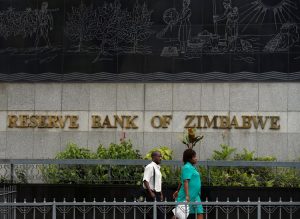
People walk past the Reserve Bank of Zimbabwe building in Harare, Zimbabwe, February 25, 2019. REUTERS/Philimon Bulawayo
“It was resolved that a formal market-based system of foreign exchange trading will be put in place. To ensure that foreign currency trades were monitored in real-time, the committee (Monetary Policy Committee) urged the bank to expedite the implementation of the electronic foreign exchange trading system for compulsory use by bureaux de change,” RBZ governor John Mangudya said in a statement yesterday.
“The committee also urged more active application of the open market operations bills to deal with any identified excess liquidity balances in the market.”
The decision by the RBZ boss came following a sitting of the bank’s Monetary Policy Committee on May 22, 2020 which considered a wide range of issues confronting the local economy.
Currently, the entire market whether formal or informal is operating based on the daily parallel market rates which continue to fuel the annual inflation rate that stood at 765,57% as of April.
Renowned US economist Steve Hanke has described the Zimdollar as the second junkiest currency in the world. “Today, the parallel market rate has traded between 80 and 85. In mid May 2020, it was 40. An increase of 100% in three weeks reflects the black market implosion,” former Finance minister, Tendai Biti, tweeted.”The restrictive measures by the central bank are corroding the Zimdollar and, therefore, self-defeating. They have run out of ideas,” he added.
As a result of the continued fall of the Zimdollar, the RBZ has been seeking to promote production to boost exports. Mangudya also announced that there was need to release more financial resources for the productive sectors of the economy by banks.
“To assist that process, the committee resolved to reduce the statutory reserve ratio from the current 4,5% to 2,5% with effect from June 8, 2020,” he said.
The statutory reserve ratio refers to the percentage of a bank’s deposit holdings that must be preserved by the central bank as a form of security.
Mangudya added: “The committee also resolved to reinstate, with effect from July 1, 2020, the 30-day limit of liquidating surplus foreign exchange receipts from exports in order to ensure that more foreign exchange was released onto the market.”
Post published in: Business

